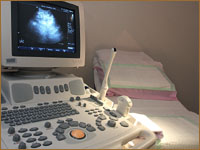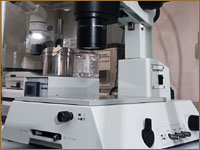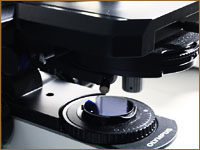| |
 Ultrasound scanning can detect most fetal congenital structural abnormalities, e.g. anencephaly, spina bifida, hydrocephaly and dwarfism, etc. Ultrasound scanning is a non-invasive procedure which has no harmful effect on the foetus. Fetal anomaly scan which is an even more detailed ultrasound procedure, is best carried out at 20 weeks of gestation to screen for fetal abnormality. Ultrasound scanning can detect most fetal congenital structural abnormalities, e.g. anencephaly, spina bifida, hydrocephaly and dwarfism, etc. Ultrasound scanning is a non-invasive procedure which has no harmful effect on the foetus. Fetal anomaly scan which is an even more detailed ultrasound procedure, is best carried out at 20 weeks of gestation to screen for fetal abnormality.
|
| |
 Amniocentesis can detect all chromosomal abnormalities and is accurate in diagnosing Down's syndrome. The test is usually performed between 16 and 20 weeks of gestation. Meals can be taken as usual before and after the procedure. The doctor will commence with an ultrasound scan before the procedure to determine the best site to insert the needle, to avoid the foetus and the placenta. A special needle will then be passed through the abdomen into the uterus to extract 20 ml of amniotic fluid for analysis. The pregnant mother may feel some pain during the procedure, but it has no harmful effect on the foetus. It is advised that the mother be accompanied by a relative or friend on the day of check-up. She can return to work after a day of rest. The risk of miscarriage after amniocentesis is around 0.5%. Apart from this, no other serious complications are associated with the procedure. Amniotic fluid PCR (Chromosomes 13, 18, 21 and sex) results will be available in one week, while final cell culture results are usually available three to four weeks following the procedure. The full report will be sent to the respective doctor-in-charge as soon as possible for detailed explanation to the patient. Amniocentesis can detect all chromosomal abnormalities and is accurate in diagnosing Down's syndrome. The test is usually performed between 16 and 20 weeks of gestation. Meals can be taken as usual before and after the procedure. The doctor will commence with an ultrasound scan before the procedure to determine the best site to insert the needle, to avoid the foetus and the placenta. A special needle will then be passed through the abdomen into the uterus to extract 20 ml of amniotic fluid for analysis. The pregnant mother may feel some pain during the procedure, but it has no harmful effect on the foetus. It is advised that the mother be accompanied by a relative or friend on the day of check-up. She can return to work after a day of rest. The risk of miscarriage after amniocentesis is around 0.5%. Apart from this, no other serious complications are associated with the procedure. Amniotic fluid PCR (Chromosomes 13, 18, 21 and sex) results will be available in one week, while final cell culture results are usually available three to four weeks following the procedure. The full report will be sent to the respective doctor-in-charge as soon as possible for detailed explanation to the patient.
|
| |
 The information obtained from chorionic villus sampling (CVS) is similar to that of amniocentesis. CVS is performed between 11 and 14 weeks of gestation. The procedure involves introducing a needle under ultrasound guidance through the abdominal wall, reaching the placental site and obtaining a small amount of placental tissue for analysis. Local anaesthesia will be given to numb the needle insertion site. The risk of miscarriage is around 1%. CVS PCR (Chromosomes 13, 18, 21 and sex) results will be known in one week while the final report on cell culture will be available in three to four weeks time. The information obtained from chorionic villus sampling (CVS) is similar to that of amniocentesis. CVS is performed between 11 and 14 weeks of gestation. The procedure involves introducing a needle under ultrasound guidance through the abdominal wall, reaching the placental site and obtaining a small amount of placental tissue for analysis. Local anaesthesia will be given to numb the needle insertion site. The risk of miscarriage is around 1%. CVS PCR (Chromosomes 13, 18, 21 and sex) results will be known in one week while the final report on cell culture will be available in three to four weeks time.
|
| |
|
 What if the test results are positive? What if the test results are positive?
An increased risk does not mean that the baby is abnormal. It only means that further invasive tests, such as amniocentesis or CVS, need to be considered to confirm whether the baby is normal or has Down's syndrome.
What does a negative test result mean?
Negative results only indicate that the risk that the baby has Down's syndrome as compared to that of pregnant women aged 35 is low. However, it does not completely eliminate the possibility that the foetus may have Down's syndrome or other chromosomal abnormalities. This test is not a test for intelligence or structural abnormalities.
|
| |
|
|
